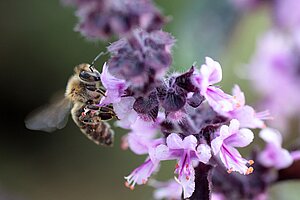Biodiversity: Setting the course for the coming decades

The UN member countries reaffirmed an ambitious target at the second working group meeting of the UN Convention on Biological Diversity (CBD), at which the development of a new global biodiversity framework was discussed.
The global report of the Intergovernmental Platform on Biodiversity and Ecosystem Services (IPBES), published in May 2019, makes an impressive point: Human interventions in nature have drastically changed our planet. Up to 1,000,000 species are now threatened with extinction, many of them within the next few decades. The loss of species and ecosystems also poses a direct threat to human well-being. Rapid action, both global and local, is urgently needed, since most of the Aichi biodiversity goals for the period 2011–2020 agreed upon at the 10th Conference of the Parties to the UN Convention on Biological Diversity (CBD) in 2010 have not yet been achieved. The international community must therefore focus more intensively on specific, ambitious goals and on improved conditions for their implementation and the measurement of their impacts.
2020 is a ‘super year’ for biological diversity
2020 will be a forward-looking year for the international community and the CBD. This is because the 15th Conference of the Parties (CBD COP 15), which will be taking place in October 2020 in Kunming, China, will work on the adoption of a new global framework for the protection of biological diversity, the sustainable use of its components and a fair and equitable sharing of benefits from the use of genetic resources. The message is clear: the conservation of biological diversity is a global task for the society as a whole, one that requires unprecedented efforts and a global transformation process.

The new global framework – an agreement to benefit man and nature – must motivate countries to implement their CBD commitments with greater determination. Human needs and direct and indirect drivers of biodiversity loss such as land use, pollution and climate change must therefore be specifically addressed (especially food, water, health and disaster prevention). Capacity building, cooperation, mobilisation of resources and mainstreaming, namely the anchoring of biodiversity criteria in all relevant sectors of the economy, but also in areas such as education, health, are essential for the implementation process. Participation, partnerships and political will must combine to form a solid foundation for implementation.
Status of the negotiation process – ‘The Road to Kunming’
In preparation for the Conference of the Parties, the Parties to the CBD met in Rome from 24 to 29 February 2020 to discuss the development of the new framework at the second ‘Open ended Working Group’ (OEWG-2). The first meeting was held in Nairobi in 2019, when the general process was still being defined. In Rome, Parties and observers, such as non-governmental organisations (NGOs) and UN organisations exchanged their views on the first proposed text of the framework (‘Zero Draft’).
In addition to five overarching long-term goals up to 2050 and intermediate stages up to 2030, the Conference also dealt with 20 action goals up to 2030, which should be specific, measurable, achievable, realistic and time-bound (SMART); they include protected areas, land use, protection against invasive species, the fight against poaching, sustainable consumption and production, as well as mitigation and adaptation to climate change.
The third and final working group meeting (OEWG-3) will be held in Colombia in July 2020, before the CBD COP 15 takes place. Until then a ‘First Draft’ is to be prepared and discussed. The results of the meetings of the Subsidiary Body for Scientific, Technical and Technological Advice (SBSTTA-24) and the Subsidiary Body for Implementation of the CBD (SBI 3) of May 2020 will also be taken into account.
The link has been copied to the clipboard
Contact
IKI Office
Zukunft – Umwelt – Gesellschaft (ZUG) gGmbH
Stresemannstraße 69-71
10963 Berlin


